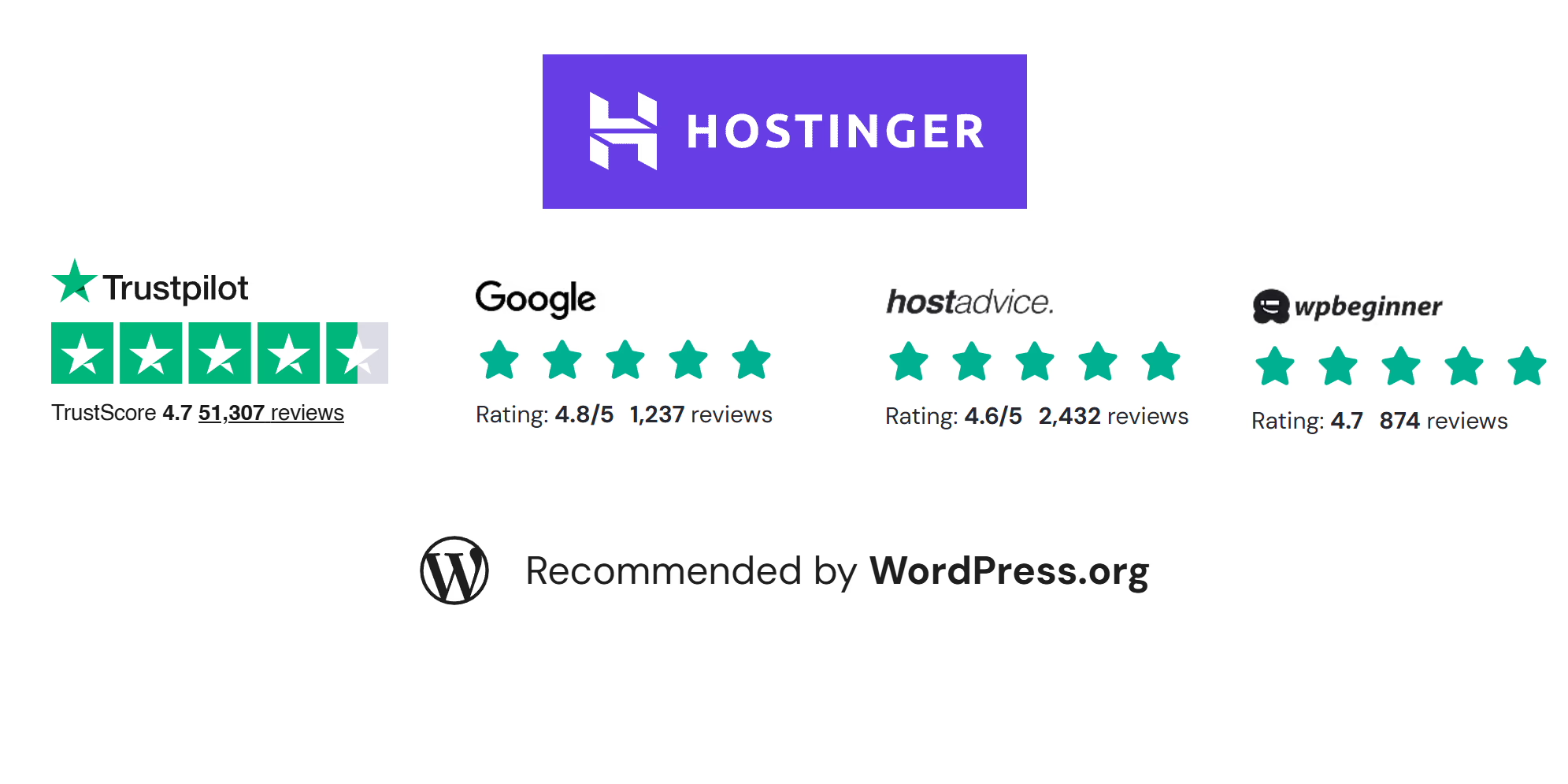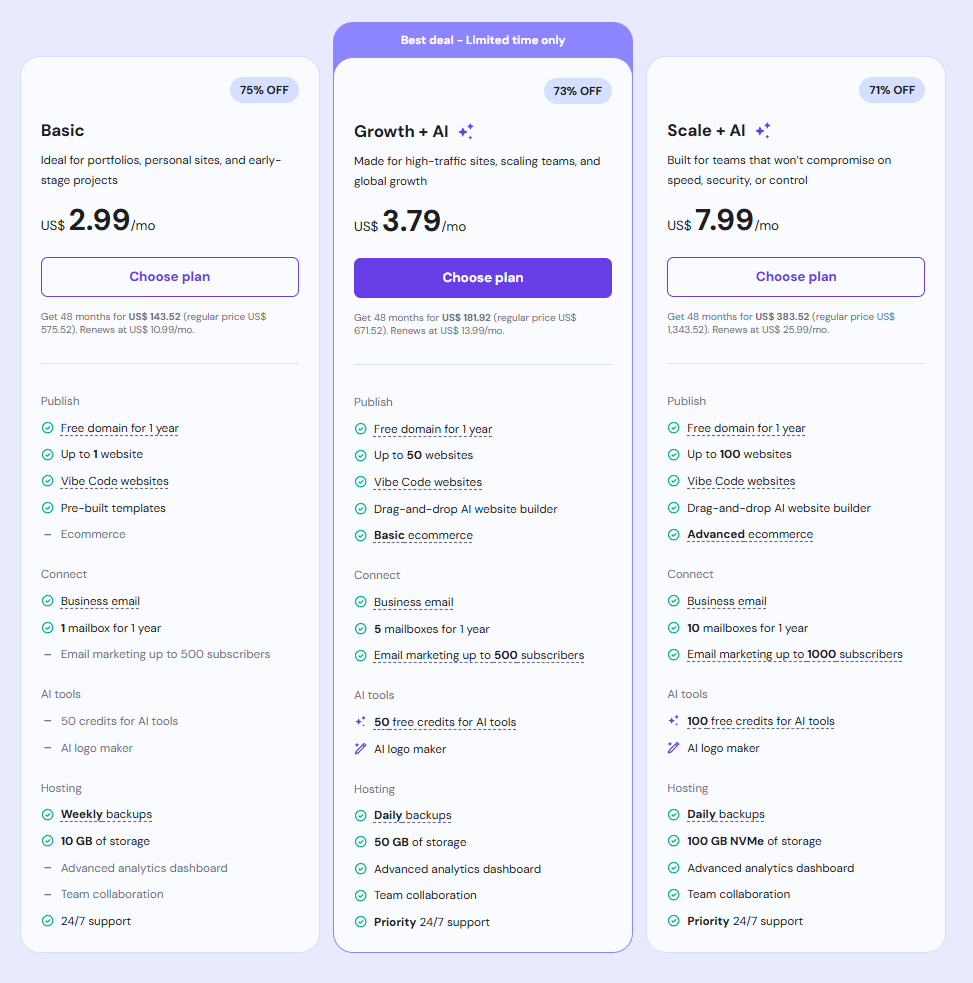Hostinger Web Hosting Review 2025
Comprehensive Analysis
- Affordable entry-level plans ideal for startups and personal sites.
- Strong emphasis on AI tools for quick site creation.
- Global data centers enhance accessibility.
- Lacks dedicated hosting for high-demand enterprises.
- Some users report occasional inconsistencies in advanced features.
Pricing and Value for Money
Hostinger is renowned for its budget-friendly pricing, offering some of the lowest introductory rates in the industry. Shared hosting plans start at $2.49 per month for a four-year commitment, with renewal rates ranging from $7.99 to $13.99 per month depending on the plan. The Premium and Business shared hosting plans allow hosting up to 100 websites, making them ideal for users managing multiple projects. Cloud hosting and VPS plans are also competitively priced, with VPS starting at $4.99 per month for a 24-month commitment and cloud hosting plans ranging from $9.99 to $29.99 per month.
However, there are some caveats. To secure the lowest prices, users must commit to long-term plans (up to four years), and renewal rates are significantly higher. For example, the Single shared hosting plan in India drops from ₹399/month to ₹89/month with a 48-month commitment. This pricing structure may deter users seeking short-term flexibility, as monthly plans are considerably more expensive. Hostinger offers a 30-day money-back guarantee, which is standard but less generous than competitors like DreamHost’s 97-day guarantee.
Compared to competitors, Hostinger’s pricing falls between IONOS ($1/month introductory) and GoDaddy ($6.99/month introductory). It offers better value than GoDaddy due to more included features like free SSL, email, and domain registration with select plans. However, premium hosts like Kinsta or Cloudways may provide more robust managed services for higher-tier needs.
Pricing Options for Hostinger (Click to View) Get a Discount!!
Using this link will give you an additional 20% discount on any package you sign up for.
Performance and Reliability
Hostinger delivers strong performance for a budget host, particularly for shared and WordPress hosting. Key performance metrics include:
- Uptime: Hostinger guarantees 99.9% uptime, an industry standard, and testing confirms excellent reliability. A month-long test by WebsitePlanet recorded 100% uptime, while TechRadar reported 99.96% over 10 weeks. Uptime.com measured response times ranging from 171ms to 1.73s, averaging 382ms, which is slightly slower than some competitors but acceptable for shared hosting.
- Speed: Hostinger uses LiteSpeed web servers, which outperform traditional Apache servers, and includes LiteSpeed Cache for WordPress to enhance site speed. A TechRadar test recorded a low Largest Contentful Paint (LCP) of 0.607 seconds, the second fastest among 15 tested hosts. Dotcom Tools’ Website Speed Test showed an average page load time of 878ms, placing Hostinger in the top 25% of providers. The in-built cache manager and object cache (available on Business plans and above) further boost performance for dynamic websites and e-commerce stores.
- Data Centres: Hostinger operates 10 data centres across the USA, UK, France, Netherlands, Lithuania, India, Brazil, Indonesia, Singapore, and Australia (though Singapore was recently closed). This global presence reduces latency for international audiences, though some plans (e.g., VPS) are limited to specific locations. Users can switch server locations via the hPanel, a feature not all hosts offer.
- Stress Testing: In a TechRadar stress test with 15 virtual users, Hostinger handled 15 requests per second, comparable to other shared hosting providers. Higher-tier cloud or VPS plans can manage more traffic, making them perhaps more suitable for larger, growing websites.
Pros:
- Consistent 100% uptime in extended tests.
- Superior speed outperforming many budget competitors.
- Global optimization reduces latency.
Cons:
- Occasional slowdowns on entry-level shared plans.
- Some reports of site hibernation for inactive users.

Features and Tools
Hostinger offers a robust set of features tailored to beginners and small businesses, with a focus on WordPress optimisation and AI-driven tools:
Hosting Types: Hostinger provides shared, WordPress, VPS, cloud, and agency hosting plans. Shared hosting is ideal for beginners, while WordPress hosting includes tools like one-click installation, LiteSpeed Cache, and a WP Starter wizard. VPS and cloud plans cater to users needing more power and scalability.
Website Builder: Hostinger’s AI-powered Website Builder includes features like a logo builder, slogan generator, and AI Writer for content creation. The AI Heatmap provides insights into visitor behaviour, helping optimise site design. These tools are particularly useful for non-technical users.
WordPress Optimisation: As a WordPress.org-recommended host, Hostinger offers automated updates, staging environments, and multisite support. Managed WooCommerce hosting includes features for e-commerce sites, such as pre-built templates and scalability options.
Additional Features: Free SSL certificates, Cloudflare DNS protection, malware scanners, and automated backups (weekly on Premium plans, daily on higher tiers) are included. Hostinger Reach, an AI-powered email marketing tool, integrates with WordPress plugins like Gutenberg and WPForms. Users can host up to 100 email accounts, though there are limits (15,000 messages per account, 500 emails sent daily).
Control Panel: Hostinger uses its custom hPanel instead of cPanel, which is intuitive and beginner-friendly. It centralises website, domain, and email management, though advanced users may miss cPanel’s familiarity. Notably, cPanel is available for VPS plans but incurs an additional cost ($23/month for the base KVM 1 plan).
Pros:
- Cutting-edge AI tools accelerate site building and content creation.
- Comprehensive one-click integrations and e-commerce support.
- Free extras like migrations and CDN boost efficiency.
Cons:
- Advanced users may find some tools basic.
- Limited customization in lower-tier plans.
Customer Support
Hostinger provides 24/7 customer support via live chat and email, but lacks phone support, which may be a drawback for users preferring direct communication. Response times vary, with some users reporting connections within minutes and others experiencing waits of up to 20 minutes. Support agents are generally knowledgeable and provide clear, actionable solutions, often with annotated screenshots.
The knowledge base is extensive, offering tutorials on hPanel, DNS, SSL, and more, though the search function is less effective than browsing categories. Hostinger also provides video tutorials for tasks like WordPress setup and e-commerce store creation, enhancing accessibility. Customer reviews on Trustpilot (4-star rating from 51,042 reviews) praise the support team’s efficiency, patience, and multilingual capabilities (8+ languages). However, some users note that responses can feel like canned AI replies, though follow-ups often connect to real agents.
- Fast, expert responses via chat.
- Comprehensive self-help resources.
- Positive feedback on resolution efficiency.
- No phone support available.
- Mixed reports of delays or scripted replies for complex issues.
Security
- Free SSL certificates for all plans.
- Cloudflare-protected nameservers for DDoS protection.
- Malware scanners and BitNinja security.
- Patchstack Security for WordPress vulnerability detection.
- Two-factor authentication (2FA) and IP/country blocking via Hostinger’s CDN.
- Automated backups (weekly for Premium plans, daily for higher tiers), stored on separate servers for added safety.
Pros:
- Comprehensive free protections like DDoS and SSL.
- AI-enhanced security for proactive threat detection.
- Reliable backups minimize data loss.
Cons:
- Basic features may not suffice for regulated industries.
- Some users note vulnerabilities in add-ons.
User Experience and Ease of Use
Hostinger excels in usability, particularly for beginners. The hPanel is clean, modern, and intuitive, simplifying tasks like domain setup, email configuration, and site migration. Free website migrations are a standout feature, with 95% of migrations completed in under 20 minutes and no downtime. The onboarding process is straightforward, with options to sign up using email, Google, or Facebook, and a temporary domain for users without a registered domain.
The AI-powered Website Builder and WordPress tools make site creation accessible to non-technical users. However, some users find the interface complex to navigate initially, requiring time to adapt. Trustpilot reviews highlight Hostinger’s user-friendly design but note occasional challenges with editing or navigation.
Pros:
- Intuitive interface for quick learning.
- AI tools simplify complex tasks.
- Seamless for multi-site management.
Cons:
- Less familiar for cPanel veterans.
- Some advanced options buried in menus.
Scalability and Flexibility
Hostinger offers a clear upgrade path from shared to cloud and VPS hosting, making it suitable for growing websites. The ability to host up to 100 websites on Premium and Business plans is ideal for agencies or users managing multiple projects. VPS plans provide up to 8 vCPU cores, 32GB RAM, and 400GB storage, while cloud hosting leverages Google Cloud Platform for resource-intensive sites. However, Hostinger lacks dedicated hosting, which may limit its appeal for enterprise-level needs.
Pros:
- Easy upgrades with minimal downtime.
- High resource scalability for traffic spikes.
- Flexible VPS for custom configurations.
Cons:
- Location restrictions on some VPS plans.
- No unmanaged options for full control.
Customer Feedback and Reputation
Hostinger enjoys a strong reputation, with a 4-star Trustpilot rating from over 51,042 reviews. Users praise its affordability, performance, and customer service, with many recommending it for beginners and small businesses. WordPress.org’s endorsement further bolsters its credibility. However, some users report issues with renewal pricing and interface complexity. A 2019 data breach raised concerns, but Hostinger’s proactive response restored trust.
Pros:
- High Trustpilot ratings for support and value.
- Expert endorsements for performance.
- Positive X feedback on speed and tools.
Cons:
- Lower Sitejabber score due to billing complaints.
- Some X/Reddit reports of suspensions.
Verdict
Hostinger is an excellent choice for beginners, bloggers, and small businesses seeking affordable, high-performing web hosting with robust WordPress tools and AI-driven features. Its LiteSpeed servers, global data centres, and intuitive hPanel ensure strong performance and ease of use, while free migrations and a 30-day money-back guarantee reduce risk. However, high renewal rates, lack of phone support, and weekly backups on lower-tier plans may deter some users. For those prioritising value and simplicity, Hostinger is a top contender, earning accolades like CNET’s Editors’ Choice Award for best value web host.
Recommendation: Choose Hostinger if you’re starting a personal site, blog, or small e-commerce store on a budget. For enterprise-level needs or advanced managed services, consider premium hosts like Kinsta or Cloudways.
Pricing Options for Hostinger (Click to View) Get a Discount!!
Using this link will give you an additional 20% discount on any package you sign up for.
Trusted Sources:
Hostinger vs Other Web Hosting Providers
IONOS
Pros of Hostinger
- Hostinger offers more affordable long-term pricing with lower renewal rates, saving users money over time compared to IONOS's higher ongoing costs.
- Hostinger provides a modern, intuitive dashboard that's easier for beginners and less tech-savvy users, while IONOS feels more suited for experienced users.
- Hostinger includes top-shelf security features like SSL certificates even on entry-level plans, surpassing IONOS in baseline protection.
- Hostinger delivers faster server response times and better overall performance metrics.
- Hostinger ensures higher uptime reliability, often achieving 100% in tests, compared to IONOS.
Cons of Hostinger
- Hostinger has higher upfront costs than IONOS, which offers cheaper initial pricing.
- Hostinger provides fewer shared hosting plan options (only two) versus IONOS's four plans.
- Hostinger lacks the geo-redundancy and daily backups that IONOS emphasizes for superior data durability.
GreenGeeks
Pros of Hostinger
- Hostinger's plans are more budget-friendly with better discounts and lower overall costs than GreenGeeks.
- Hostinger supports up to 100 websites on its plans and includes an AI website builder, offering more versatility.
- Hostinger provides website staging, a feature absent in GreenGeeks.
- Hostinger has higher user and editor ratings for overall performance and features.
- Hostinger offers faster load times and better value for non-eco-focused users.
Cons of Hostinger
- Hostinger is not as environmentally friendly, lacking GreenGeeks' focus on green energy and eco-hosting.
- Hostinger may have less emphasis on renewable energy credits, which GreenGeeks matches at 300%.
- Hostinger's support might not match GreenGeeks' for users prioritizing sustainability features.
InMotion Hosting
Pros of Hostinger
- Hostinger is significantly cheaper, with lower initial and renewal rates than InMotion's more expensive plans.
- Hostinger offers faster lightning speed and a 99.9% uptime guarantee with robust security at a lower cost.
- Hostinger provides a more beginner-friendly interface and easier WordPress setup.
- Hostinger includes more global data centers for better worldwide performance.
- Hostinger caps storage higher in VPS plans (up to 250GB) compared to InMotion's limits in some areas.
Cons of Hostinger
- Hostinger restricts unlimited websites to higher plans, while InMotion allows them on Power and Pro tiers.
- Hostinger offers limited email accounts, unlike InMotion's unlimited mailboxes.
- Hostinger lacks some advanced features and resources that InMotion provides for scaling.
SiteGround
Pros of Hostinger
- Hostinger is cheaper with more storage and support for more websites per plan.
- Hostinger delivers faster load times and better TTFB (513ms vs SiteGround's 1164ms).
- Hostinger offers affordable renewal pricing without shocking increases.
- Hostinger provides a more intuitive interface for beginners.
- Hostinger includes global server networks for superior speed in diverse locations.
Cons of Hostinger
- Hostinger has lower uptime in some tests (99.9% vs SiteGround's 99.99%).
- Hostinger lacks SiteGround's premium managed WordPress features and advanced caching.
- Hostinger's support may not be as responsive for complex issues as SiteGround's.
DreamHost
Pros of Hostinger
- Hostinger offers more variety in plans at cheaper prices with comparable features.
- Hostinger provides faster response times and an easier control panel.
- Hostinger includes AI-powered site builders and unlimited SSL, which DreamHost matches but at higher costs.
- Hostinger supports more websites and offers better global performance.
- Hostinger has lower renewal rates and more beginner-friendly tools.
Cons of Hostinger
- Hostinger lacks DreamHost's strong emphasis on privacy and open-source commitment.
- Hostinger's storage starts lower in basic plans compared to DreamHost's unlimited options.
- Hostinger may not offer as seamless WordPress integration for advanced users as DreamHost.
Kinsta
Pros of Hostinger
- Hostinger is far more affordable, starting at lower prices without Kinsta's premium costs.
- Hostinger offers more storage (100GB SSD vs Kinsta's 10GB) and unlimited bandwidth.
- Hostinger is easier for beginners with zero tech experience.
- Hostinger provides faster load times at budget prices.
- Hostinger supports a wider range of websites beyond just a WordPress focus.
Cons of Hostinger
- Hostinger lacks Kinsta's advanced staging sites and premium WordPress optimization.
- Hostinger's support is not as specialized for high-traffic WordPress sites as Kinsta's.
- Hostinger doesn't run on Google Cloud Platform like Kinsta for enterprise-level performance.
A2 Hosting
Pros of Hostinger
- Hostinger is more affordable with better value for money and a free domain/SSL.
- Hostinger offers global data centers for better worldwide speed.
- Hostinger provides a user-friendly panel with staging and backups.
- Hostinger has faster overall performance in tests compared to A2's variable uptimes.
- Hostinger includes AI tools and more features at lower costs.
Cons of Hostinger
- Hostinger lacks A2's high-speed Turbo servers for up to 20x faster sites.
- Hostinger has lower CPU/RAM limits in shared plans than A2.
- Hostinger's customer support may not be as reliable as A2's for speed-focused users.
Bluehost
Pros of Hostinger
- Hostinger is cheaper with better uptime guarantees and AI-powered tools.
- Hostinger offers faster load times and handles more traffic.
- Hostinger provides more storage and websites per plan.
- Hostinger has a more intuitive interface and global servers.
- Hostinger includes automatic backups and better security without extra costs.
Cons of Hostinger
- Hostinger lacks Bluehost's deep WordPress integration and endorsements.
- Hostinger may require unexpected upgrades for high traffic, similar to but worse than Bluehost.
- Hostinger's support can be inconsistent compared to Bluehost's for beginners.
HostGator
Pros of Hostinger
- Hostinger is faster with LiteSpeed servers and NVMe SSD for better load times.
- Hostinger offers lower pricing and more value, including AI tools.
- Hostinger provides better security with custom firewalls and SSL at no extra cost.
- Hostinger has a more modern, user-friendly control panel.
- Hostinger supports unlimited bandwidth and more scalable plans affordably.
Cons of Hostinger
- Hostinger lacks HostGator's semi-managed VPS options for hands-on users.
- Hostinger's renewal prices can increase, though less shockingly than HostGator's.
- Hostinger may not monitor servers as proactively as HostGator in VPS plans.


